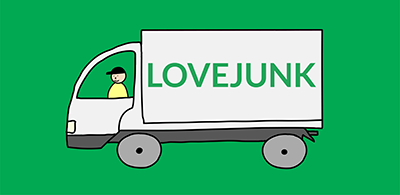10 Great Ways to Save Money on Skip Hire
Here are our best 10 tips for cutting the cost of skip hire:
- Don’t hire a skip
- Big is beautiful
- Share a skip with your neighbours
- Off-road not on-road
- Separate your waste
- Break down bulky waste
- Don’t overfill it
- Protect your driveway from skips
- Don’t keep the skip driver waiting
- Check your skip company isn’t about to go bust
Before hiring a skip, it is important to first question whether you actually need one. In many instances, hiring a skip is not the only solution and in reality there may be several other easier, greener and potentially cheaper alternatives available.
For more help on this, check out our bulky waste disposal guide for householders which covers the different ways to get rid of rubbish you can’t fit in your bin including reuse, taking it to the dump, skip hire, Hippo bags, council bulky waste collection services, and man & van rubbish removal.

The larger the skip, the less it costs per cubic yard/metre to hire it. So if you have the space on your property and enough waste to fill it, it’s usually better value to go for the largest skip available.
However, don’t forget that the price is the price regardless of whether you fill it. So be careful not to get carried away and order a monster-sized skip, because you may end up paying to fill it with thin air!
Check out our skip size guide for more advice and information on the different size of skips.
If you don’t have enough waste to fill a really big skip, it is worth considering whether you could team up with a neighbour or two. Ordering a large skip and splitting the cost with your neighbours is a great way of saving money. Plus, it has the added bonus of stopping them from filling it up overnight when you’re not looking! BTW, if you don’t know many of your neighbours, there’s a great business called Nextdoor which helps you connect to them.
If you have enough space on your property to place the skip off the road (e.g. on your driveway or in your yard) then do so because it will save you money. Putting a skip on a public road requires a skip permit from the council which can add around £50 to the overall hire cost. Plus, if you need to put the skip in a controlled parking zone (i.e. pay and display or resident permit area) you will also have to pay for a CPZ suspension fee which adds more to the cost (in some London boroughs this can be more than £100 per day!). For more information on skip permits and parking suspensions for skips check out our handy skip permit guide.

A standard skip is for ‘mixed general waste’. Mixed general waste means you can put pretty much any sort of waste in the skip except for hazardous waste. However, some bulky waste materials that are very recyclable – the most common being metal, inert waste, green waste and cardboard – cost the waste companies less to dispose of (or even earn them money), once they have been separated out. As a result, many skip firms charge less for skips that are filled just with these materials. So, if you have enough inert waste, metal, green waste or cardboard & paper to fill a whole skip, let the skip company know in advance and see if they’ll adjust the price.
Skips tend to be hired out at a flat rate (based on the size of the skip) and not by the weight of waste you put in them. So, the more waste you can squeeze into them, the better the value. In other words, take time to break down and flatten your bulkier waste as much as possible before putting it in the skip. Bear in mind that even if a skip does have extra weight charges, these are unlikely to kick in unless you really do have lots of very heavy waste like earth or rubble. So, breaking down your waste is rarely a bad idea.
When filling a skip, it’s important to be cautious of the level load. If you fill it past the top of the skip, you run the risk of being charged for the extra contents or having them removed and left on your property by your skip supplier. Only level loads are accepted and if you’re looking to say money, stick to them. Most skips will have ‘level loads only’ written on the side and it’s there for a reason – if loaded past this point it becomes dangerous to transport as waste could fall out when moving and cause damage.

If you intend to place the skip on your driveway, make sure you or the skip provider puts down proper protection to ensure the skip doesn’t damage it. Damage or marking is most likely to happen when the driveway is soft tarmac or block-paved. To reduce the chance of costly damage, good practise is to place the skip on top of wooden planks so that it’s not directly touching the driveway and helps spread the load across a wider area.
If the skip is going on your driveway, make sure your drive is empty with enough for the skip because if the driver has to wait until you’ve made room, they may add a waiting charge. Make sure you’re around when they deliver the skip too just in case there are any problems and you can make sure it’s placed where you want it.
If your skip is going on-road, it is worth asking your neighbours in advance not to park outside your house before the skip comes so there is room. Although, this is obviously not always possible if you live on a busy road.

Last but not least, check your skip firm is not about to go bust. Skip hire companies – especially smaller ones – go into liquidation surprisingly frequently, particularly with the rising costs of landfill tax and haulage. Very cheap skips are normally an indication of a skip company that is struggling to stay in business. So beware of ordering a skip from a company offering rates that are markedly better than anyone else in that region. The last thing you need is a skip full of waste left on your driveway and the skip provider having closed up shop. You can check if a company is being liquidated or in provisional liquidation here.
Other Useful Resources:
If you found this helpful, you might be interested in our other skip-related articles:












